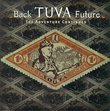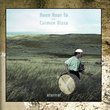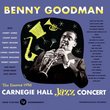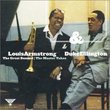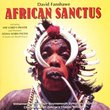| All Artists: Huun-Huur-Tu Title: If I'd Been Born an Eagle Members Wishing: 0 Total Copies: 0 Label: Shanachie Original Release Date: 1/1/1997 Re-Release Date: 1/21/1997 Genres: International Music, Pop Style: Far East & Asia Number of Discs: 1 SwapaCD Credits: 1 UPC: 016351648020 |
Search - Huun-Huur-Tu :: If I'd Been Born an Eagle
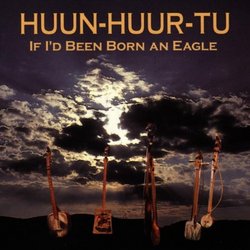 | Huun-Huur-Tu If I'd Been Born an Eagle Genres: International Music, Pop
|
Larger Image |
CD DetailsSimilar CDs
Similarly Requested CDs
|
CD ReviewsSongs of Central Asia 07/14/2000 (5 out of 5 stars) "Ted Levin said he, "first found out about the Tuvans when the physicist Richard Feynman sent us a tape from an old record he had, from Russia, (with a note) that said, 'Thought you guys might be interested in this.' When I heard it, I was blown away. I decided then and there I had to meet the people who were making those sounds." That was back in the early-'80s, when Levin was involved with a group in New York called the Harmonic Choir. They'd been experimenting with overtone singing as a kind of modernist, or what Levin calls "a contemporary minimalist" approach to music. A few years later, he found himself on a plane to the small republic west of Mongolia. "I was the first American to go there and study this music, and Tuvan culture in general. I went in 1987, on assignment from National Geographic. I made the recordings during that year and the next year that became the Smithsonian Folkways release, "Tuva: Voices from the Center of Asia." That was the first recording of Tuvan music released in the west. Levin, together with Ralph Leighton (author of Feynman's ill-fated quest, Tuva Or Bust) brought the first Tuvan musicians to the United States for a small tour in 1988. Out of that group of three, the group Huun-Huur-Tu formed, and they've been working together ever since." Magical, exotic and very musical M. Rosen | Madison, WI | 02/03/2006 (5 out of 5 stars) "I've owned this record for a few years, and listen to it frequently. My wife and I just saw Huun Huur Tu in concert a couple of nights ago, and they were fantastic. Don't be put off by the throat-singing aspect, this isn't a sound-effects record. They are a melodic and highly talented folk music group who incorporate traditional Tuvan throat-singing into their music. They play a mixture of instruments, some native Asian-style string & bow instruments (sorry, don't know the names), some acoustic guitar and simple but effective percussion. Their music evokes the sounds of nature in their native land, the cry of mullahs calling from minarets, and even some ancestry of Native American music. Their sounds are exotic, hypnotic and very relaxing. I strongly recommend this CD." No World Music Jive, Just Real Music Giordano Bruno | Wherever I am, I am. | 02/29/2008 (5 out of 5 stars) "The great physicist Richard Feynman had a lot to do with making Tuvan "throat singing" a phenomenon in the public consciousness. Now that he's gone, however, I thought the phenom might have faded. When I read that Huun-Huur-Tu would be performing at a well-known jazz club near my home on a mid-week evening, I decided to drag my aching bones to hear them. Honestly I thought the place would be comfortably empty, but I was wrong. Several hundred fans had crammed the hall, clamorous to hear a kind of music they obviously knew and loved. When the ensemble - four plain-looking men in silk pajamas with quaint wooden instruments - walked diffidently on stage, the joint went nuts.
Throat singing is more than a novelty. It's a highly disciplined art requiring earnest study. The Tuvan vocal technique doesn't stop with throat singing; there is also a "high voice" style reminiscent of Japanese classical singing, and a magical whistling technique unlike anything I've heard in other repertoires. Tuvan instruments include a side-blown flute, two kinds of bowed strings similar to the fiddles of South Asia, a guitar-like instrument used chiefly for rhythm, and percussion. In a concert hall full of people, such instruments obviously require mikes and speakers, but electronic amplification was the only concession to modernism that Huun-Huur-Tu allowed. Wow, thought I, this group has been touring and mostly living in the West for more than ten years, and yet they're remained utterly authentic! Uncontaminated! Tuvan music is inseparable from the animism of pre-modern Tuvan spiritual life. Buddhism may have been acknowledged as the high-church religion of Tuva, but it appears that animism still holds sway over the imagination of the people. Most Tuvan songs are either prayers to the spirits of places and things, or else blendings of love-longing, nature-worship and horsemanship, as described by the one singer who spoke to the audience, a man with a voice as tranquil as an ancient cedar. "If I'd Been Born an Eagle" was made ten years ago. Amazingly, I found it for sale in a local used-CD store. Some of the personnel of Huun-Huur-Tu have changed, but the music sounds exactly the same. This is an acoustic and aesthetic adventure, this CD, and an eloquent testimony to the value of saving cultural diversity from the crushing sameness of globalization and market-place pop music. Plus it's a lot cheaper than a trip to Central Asia... unless, like Richard Feynman, you become so intrigued that you HAVE to go." |

 Track Listings (16) - Disc #1
Track Listings (16) - Disc #1